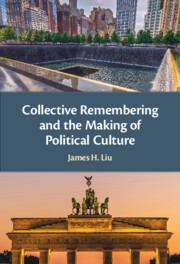Book contents
- Collective Remembering and the Making of Political Culture
- Collective Remembering and the Making of Political Culture
- Copyright page
- Contents
- Preface
- Part I Introduction to Collective Remembering
- Part II Developing a Theoretical Approach to Collective Remembering
- Part III Idiographic Case Studies of Collective Remembering
- Chapter 8 China and the United States of America
- Chapter 9 Colonization and Decolonization in Israel-Palestine and Aotearoa-New Zealand
- Chapter 10 The COVID-19 Pandemic and the Reciprocal Relationship between Past, Present, and Future
- References
- Index
Chapter 10 - The COVID-19 Pandemic and the Reciprocal Relationship between Past, Present, and Future
from Part III - Idiographic Case Studies of Collective Remembering
Published online by Cambridge University Press: 04 August 2022
- Collective Remembering and the Making of Political Culture
- Collective Remembering and the Making of Political Culture
- Copyright page
- Contents
- Preface
- Part I Introduction to Collective Remembering
- Part II Developing a Theoretical Approach to Collective Remembering
- Part III Idiographic Case Studies of Collective Remembering
- Chapter 8 China and the United States of America
- Chapter 9 Colonization and Decolonization in Israel-Palestine and Aotearoa-New Zealand
- Chapter 10 The COVID-19 Pandemic and the Reciprocal Relationship between Past, Present, and Future
- References
- Index
Summary
COVID-19 is a respiratory illness that has infected more than 217 million and taken the lives of 4.5 million people around the world.1 It spread from a wet market in Wuhan China, starting in December 2019. It may have originated from a bat. Without doubt it is the most notorious pandemic ever to be regarded as a collective memory. Disease, even when it reaches epidemic proportions, is typically forgotten in collective memory: of seventy-eight events listed in the top ten across twenty-four societies in Liu et al. (2005, 2009), only the HIV epidemic was free recalled (in one society) among the most important events in world history. The Bubonic plague that devastated Europe in the fourteenth century is not salient in the collective memory of our times, but neither is anything else from that time. More noteworthy is the collective forgetting of the “Spanish”2 flu pandemic of 1918–1919 (Johnson, 2006). It began spreading toward the end of WWI, and killed more people (between 50 and 100 million) than the war. WWI is among the most free-recalled events in world history these days, whereas the 1918 Flu Pandemic did not appear in any country’s top ten. Examination of epidemics in general and COVID-19 in particular, opens up new avenues for theorizing about top-down and bottom-up processes of the collective remembering of health issues in making political culture. The final chapter of this book ends by looking forward while also looking back.
- Type
- Chapter
- Information
- Collective Remembering and the Making of Political Culture , pp. 215 - 233Publisher: Cambridge University PressPrint publication year: 2022



